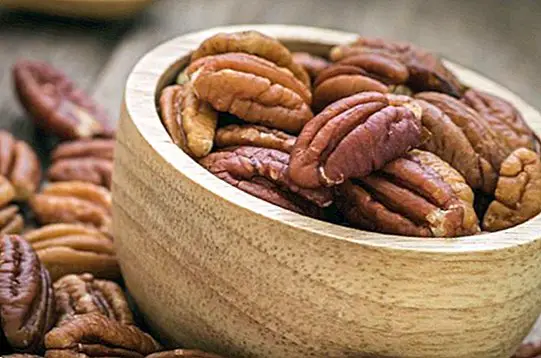Pecan nuts: benefits and properties
Nuts offer many advantages for the organism. So much so that we can eat them alone, in different dishes, accompanying seconds ... Among these, the pecan nuts They are, perhaps, less known in Spain, but each time we find them in more places.
They come from North America, being the largest world producer, hoarding more than 60% of the annual production. Pecan nuts are similar to nuts that we all know but are a little more elongated.
This nut usually has a cinnamon exterior color, the surface smooth and shiny, and has an ovoid shape. To emphasize that its shell is smooth, unlike the common nuts. They have benefits similar to the nuts we usually eat and also some differences.
- Nuts: wonderful benefits and heart-healthy properties
Nutritional properties of pecan nuts
High fiber content
When it comes to highlighting the benefits of these nuts, it should be said that, like many other nuts, they contain enough fiber, being ideal for regulating the intestine and digestion.
While this is also good for the proper functioning of the cardiovascular system, especially for people who may have it more delicate.

Monounsaturated fatty acids
Pecan nuts are rich in healthy fatty acids and monounsaturated fatty acids. Thanks to this they are perfect for lowering high cholesterol (especially LDL cholesterol). In turn, they help prevent the risk of cardiovascular disease, and are recommended, especially in the nutritional treatment of patients with breast cancer.
Vitamin E contribution
Vitamin E is totally essential in our body. And some foods, such as certain nuts and pecan nuts provide it. On the one hand, it acts as an antioxidant, and protects the cells from toxic compounds that penetrate the body and fight free radicals that cause the degeneration of tissues.
This vitamin also helps us to have adequate healing. It is beneficial when we have suffered skin burns from the sun. But there is more, because vitamin E also acts on the heart helping to prevent coronary problems. It is also characterized by being a good diuretic and protects our body from oxidation.
Vitamin B1
Pecan nuts contain vitamin B1, being basic for the proper functioning of the nervous and muscular system. Some studies, such as the University of Maryland Medical Center, establish that the so-called thiamine is anti-stress because it strengthens the immune system and improves the ability to withstand stressful conditions.
If it is ingested correctly, it helps prevent diseases such as type 1 and type 2 diabetes and protects the cells when we find high levels of glucose in the blood.
Rich in magnesium
Among the minerals that pecan nuts carry we can highlight magnesium. Calcium source and strengthening in bones and teeth. This prevents problems such as decay, growth or osteoporosis, which can arise from 50 years of age.
With copper and phosphorus
On the other hand, the contribution of copper and phosphorus minerals is interesting. Copper is an essential anti-infective, which acts immediately and effectively; while it also has an important anti-inflammatory effect. Phosphorus helps when there are gastrointestinal problems, such as diarrhea and constipation. It is also very good for memory, so it is usually indicated for people who are studying.
Zinc and selenium
Other minerals that pecans have are zinc and selenium. The first alleviates allergies and increases the natural immunity against bacterial infections. And the second helps strengthen the immune system and improves the response in cardiovascular diseases.
Moderate amount of protein
Pecan nuts, in turn, have a moderate amount of protein, which is very important so that the body does not have more proteins than adequate per day.

How many eat?
It is always recommended to take a handful of nuts a day. In particular, pecans, it is advisable to take 4 to 5 pecans daily or the equivalent of 75 grams per day.
Nutritional benefits of pecans, in summary
- High content of healthy fatty acids (especially in monounsaturated fatty acids).
- Vitamins: its content in vitamin E and vitamin B1 stands out.
- Minerals: especially rich in magnesium, copper, phosphorus, zinc and selenium.
- Moderate amount of proteins.


